Conveyor Systems | Des Moines, IA
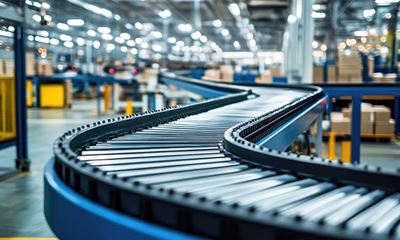
Associated designs conveyor systems and other warehouse automation equipment in Des Moines and throughout the Midwest. To learn more about our automation solutions, call us today at (515) 964-0162
Automated conveyor systems can boost the efficiency of your distribution facilities, enhance safety and substantially lower labor costs.
Today's conveyors can transport everything from heavy pallets to small packages within your facility and they are an essential component of contemporary warehouse automation.
Conveyors are classified in three different classes for almost all material handling systems:
- Powered roller or belt conveyor systems (for package handling)
- Powered roller or chain conveyors (for pallet handling)
- Non-powered conveyor systems
Powered Package Handling Roller or Belt Conveyors
Powered roller or belt conveyors are often used for smaller items like packages and cartons.
Conveyor belts are mostly employed for moving packages along a line, while roller conveyors are used for amassing packages in specific areas along the line.
Belt Conveyors
Invented more than a century ago, conveyor belts are a fundamental part of most material handling configurations. Less expensive than roller conveyors and oftentimes more appropriate for specific tasks like transporting lighter weight items, belt systems have a place in most material handling designs.
Belt systems utilize a long, looped belt that rides a series of non-powered rollers on a metal substructure called a slider belt. Motor driven pulleys turn the belt and move objects down the conveyor line.
Conveyor belts can be made of a variety of materials and surfaces according to the purpose and nature of the conveyor. For instance, a conveyor belt surface might be perfectly smooth in portions where cartons need to be pushed off the line and may have a ridged texture on segments where items must be advanced up slopes.
Roller Conveyors
Although belt conveyors are time-tested workhorses, newer roller conveyors offer a host of more useful benefits in many modern material handling uses.
Principal among these, roller configurations can enable collection of objects on the line where belt conveyors cannot. This is an important contrast because there are innumerable scenarios where items must slow down and accumulate in material handling configurations. Accumulation is often necessary when items must be paused before being relayed to automated palletizers or sorters.
Some roller conveyors also have the ability to track products on the line and implement zero pressure accumulation, meaning none of the amassed objects touch each other as they decelerate and come to a stop.
Roller designs are made up of numerous cylinder rollers that are typically controlled in one of these ways:
- Line-shaft conveyors: in a line shaft system, a long tubular shaft runs beneath the rollers at a right angle to them and is joined to each cylinder with rubber O-rings. A motor turns the shaft, and accordingly rotates the cylinders by way of the attached O-rings. Line-shaft configurations are the most cost efficient of all roller conveyors, but they may also need the most maintenance because the connections between the shaft and rollers tend to need adjustment and occasionally break.
- Belt-driven roller conveyors: As you may expect, these systems are powered by a belt mechanism that sits beneath the roller surface. A motor drives the belt, which advances the cylinders.
- MDR conveyors: Motorized roller conveyors, sometimes called motor-driven roller (MDR) systems, are set up in sections where one cylinder from each section is powered by its own drive mechanism. That one motor-driven cylinder is joined to the others in that section via rubber O-rings, thereby powers all the rollers in the section. MDR sections are positioned in sequence to create the conveyor line.
MDR systems are known for their energy efficiency because: a.) they typically are powered by 24 volt DC motors and b.) the motors can be configured to engage only when an object is detected on the cylinders, meaning they are motionless much of the time.
Although the cost of MDR conveyors is higher than belt drive and line-shaft systems, power expenses and maintenance outlays are typically much lower than the other types of conveyors. - Segmented belt conveyor: the principle of MDR conveyors ultimately led to the birth of segmented belt conveyors. Similar to motor driven roller systems, segmented belts operate independently and feature a lot of the same benefits of MDRs, including accumulation capabilities.
Powered Pallet Handling Conveyors
Powered pallet-handling conveyors are frequently coupled with AS/RS systems and automatic palletizers. Pallet handling conveyors can typically handle gross weights of up to 2 tons and operate at a much slower pace than carton handling conveyors, often at speeds of two to four pallets per minute.
Pallet-handling conveyors come in one of two types: roller conveyors and chain conveyors.
- Pallet-handling chain conveyor: perhaps the most rudimentary of all conveyor systems, pallets on a chain conveyor line are placed on top of segments of heavy duty chain. Motors propel the chain segments which consequently move the pallets along the line.
- Pallet-handling roller conveyor: analogous to motor driven roller systems, pallet handling roller configurations use larger rollers and heavy duty chains to join the powered cylinder to the rest of the cylinders in a conveyor unit.
Non-Powered Conveyors
Skatewheel or roller conveyors are the most prevalent types of non-powered conveyors used in material handling. These types of systems use gravity or inertia to advance smaller loads though pick modules, warehouses, automated sorters, workstations, package sorting areas and loading docks.
Skatewheel systems are made up of many individual wheels and require very little energy to sustain the inertia of items as they move down a conveyor line. In general, they move items quicker than non-powered roller systems and they have more versatility when it comes to setup. Because they’re standalone wheels as opposed to a belt, they can be put to use in curved segments of a conveyor arrangement.
Generally non-powered roller configurations are less costly than skatewheel conveyor systems. They’re frequently used for pick modules, workstations, and other areas where its beneficial to have a level platform to work on. Roller conveyors may also be utilized to decelerate items that originate from faster moving mechanisms like sorters so that human laborers can keep pace with system performance.
Both types of non-powered systems have a distinct disadvantage as compared with powered conveyors: by applying inertia and gravity to move materials you forgo the option to regulate the force applied to those items. Put another way, you have very little control of the inertia and speed of items on your conveyor line.
Conveyor Companies Near Me
If you’d like a full analysis of conveyor system possibilities for your storage facility, DC or other material handling operation, contact a professional at Associated.
The Associated Des Moines service area includes Des Moines, Cedar Rapids, Davenport, Sioux City, Iowa City, Waterloo, Ames, West Des Moines, Council Bluffs, Ankeny, Dubuque, Urbandale, Cedar Falls, Marion, Bettendorf, Mason City and all surrounding areas.
Associated | Des Moines Material Handling Equipment Supplier
4421 NW Urbandale Dr
Urbandale, IA 50322
(515) 964-0162
You May Also Like:
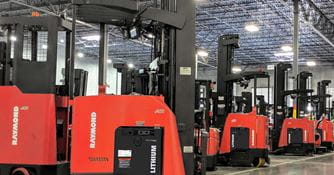
Forklift Rental | Des Moines, IA
Associated is a Des Moines based forklift dealer offering a wide range of lift truck rental options. We have one of the largest rental fleets in the Midwest.
Learn More
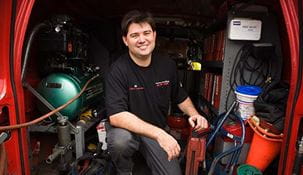
Forklift Repair & Service | Des Moines, IA
Associated is a Des Moines forklift dealer offering repair and service for all type of forklifts. We are backed by one of the largest parts divisions in the Midwest.
Learn More
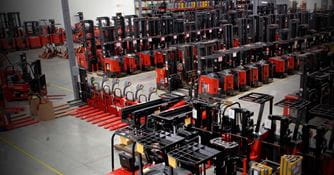
Used Forklifts | Des Moines, IA
Associated is a Des Moines forklift dealer offering both new and used lift trucks. We are backed by one of the largest parts and service divisions in the Midwest.
Learn More
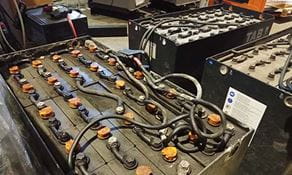
Forklift Battery | Des Moines, IA
Associated is a Des Moines material handling equipment supplier offering forklift batteries We are backed by one of the largest service and parts divisions in the Midwest.
Learn More
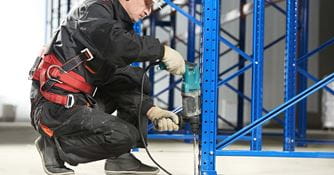
Pallet Rack Inspection, Repair and Installation | Des Moines, IA
Associated is a Des Moines material handling equipment supplier offering pallet rack installation, inspection, and repair. We are backed by one of the largest service divisions in the Midwest.
Learn More
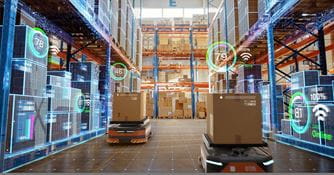
Warehouse Automation | Des Moines, IA
Associated is a Des Moines material handling equipment supplier offering warehouse automation systems. We are backed by one of the largest service divisions in the Midwest.
Learn More
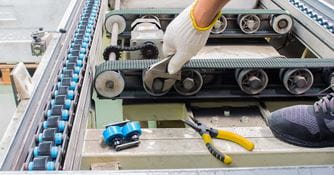
Conveyor Repair and Parts | Des Moines, IA
Associated is a Des Moines material handling equipment supplier offering repair and parts for all types of conveyors. We are backed by one of the largest parts divisions in the Midwest.
Learn More
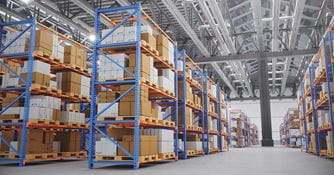
Pallet Racking | Des Moines, IA
Associated is a Des Moines based material handling equipment supplier offering many types of pallet racks.. We are backed by one of the largest parts divisions in the Midwest.
Learn More
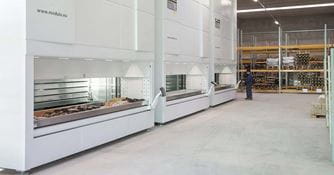
Vertical Lift Modules (VLM) | Des Moines, IA
Associated is a Des Moines based material handling equipment supplier offering vertical lift modules. We are backed by one of the largest parts divisions in the Midwest.
Learn More
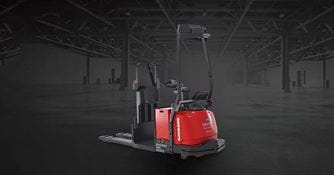
Autonomous Guided Vehicles (AGV) | Des Moines, IA
Associated sells AGVs and other warehouse automation equipment in Des Moines and throughout the Midwest. We are backed by one of the largest service and parts divisions in the Midwest.
Learn More
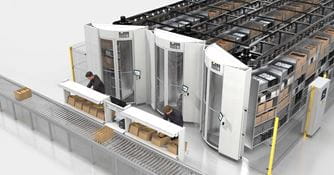
Modula Systems | Des Moines, IA
Associated is an authorized distributor for Modula equipment in the Des Moines area. We are backed by one of the largest service and parts divisions in the Midwest.
Learn More
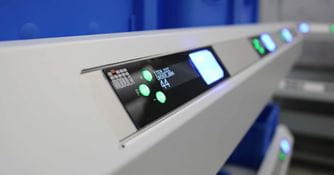
Order Picking Systems | Des Moines, IA
Associated offers advanced picking systems and other warehouse automation equipment in Des Moiens and throughout the Midwest.
Learn More
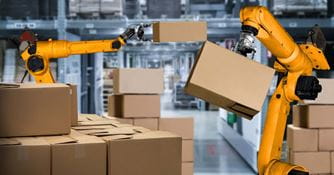
Warehouse Robotics | Chicago, IL
Learn More
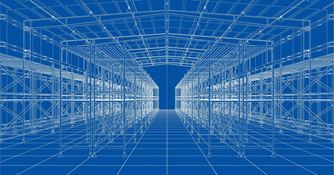
Warehouse Design | Des Moines, IA
Associated offers complete warehouse design and engineering services in Des Moines and throughout the Midwest.
Learn More

